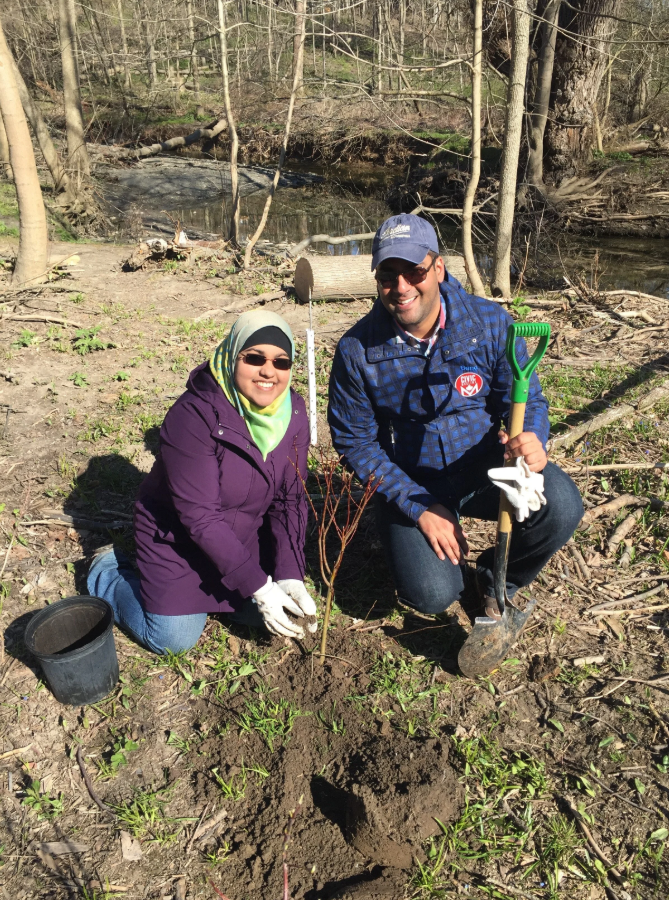Muaz Nasir
… has brought environmental programming and green building upgrades into thousands of mosques in Canada and around the world
Muaz Nasir founded the website Khaleafa a decade ago as part of his own learning journey about the connections between Islam and climate and environmental issues. Over time, the website grew from a casual blog into an important resource for Muslim leaders interested in connecting faith to environmental work. In 2012 Khaleafa launched the Green Khutbah Campaign, encouraging Imams in Canada and around the world to dedicate a sermon to environmental issues the Friday prior to Earth Day, providing sample sermons and reputable resources to personalize the issues to their country and community: “You had mosques in Indonesia that were citing rainforest destruction for palm oil plantations. Sermons around saving old growth rainforests. And mosques in South Africa were linking it to the water shortage, and the importance of conserving water from an Islamic perspective.” Over time, the Green Khutbah Campaign has reached thousands of mosques, serving hundreds of thousands of Muslims – all done on a purely volunteer basis by Muaz, on evenings and weekends outside of his other work.
In addition to the blog and annual campaign, Muaz started informally advising mosques on green upgrades to their building infrastructure, community gardens and water use. This work built off the efforts he was already engaged in over nine years as an Advisory Board Member for TD Friends of the Environment Foundation, and today as a Board Member with Faith and the Common Good.
The national and international reach of Muaz’s volunteer efforts is a powerful example of how leaders across the country are already connecting climate and environmental priorities to their communities’ needs, whether or not the “mainstream” environmental movement recognizes that work. And Muaz has seen the diversity and strength of the environmental movement grow over the years: on his first day attending the Masters of Environmental Studies at York University, “I was in a room filled with about 200 incoming graduate students and there were only five students who were of a visible minority. It was a culture shock, because I grew up in the East end of Toronto – my high school, my university, were all very, very diverse.”
Since then, he’s seen the Muslim environmental movement in Canada grow exponentially, with different organizations developing their own niche: Green Ummah focusing on environmental education; Environmental Muslims on workshops and support for mosques, and the international focus of the United Nations’ Al-Mizan program: “People have taken up various environmental causes and issues with a spiritual perspective. They're adapting it to their own communities; and their own needs, their own theological perceptions of the world are integrated into that.”
On how newcomer communities go green:
“When I started this work, especially with the mosques, the environment was not on the radar in newcomer communities. Their first mandate is just getting a foothold in Canada, right? So at first they're building mosques, they're trying to build brick and mortar institutions. But the social programming has evolved a lot, and environmentalism is part of that. As the community matures here in Canada, the environment will become more ingrained on a day to day basis. So the early adopters were looking at water efficiency, energy efficiency. Now they're forming green teams, they're working with other organizations on climate and environment initiatives, and so forth.”
The power of acting locally:
“The work that I’ve done, I start local and then work my way out globally. A lot of the projects that I did were focused on: what can the individual do? Because sometimes when you take the global approach, you get overwhelmed. Individuals see what they can do, they kind of build it up to their community center, their mosque, or whatever organizational sphere that they're in. And then organizations will band together on various social initiatives.”
“It’s important to have an awareness that the demographics of Canada are changing, and the demographics of the environmental movement are changing as well. And if you don't adapt with that as well, unfortunately, you might be left behind, right?”
On supporting faith-based climate work:
“There is a niche in funding faith-based environmental work because a lot of donors don't want to be seen as being aligned to one particular faith group or the other. So unfortunately, a lot of faith groups, when they apply for funding for projects, they get turned down. What I've seen, especially in Toronto, is to get very creative just because land is so tight: a church will partner with a neighboring school or a seniors center and put in a joint application. And then those ones will more likely get funding as opposed to a standalone application.”




